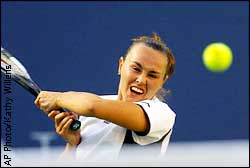| | Results
NEW YORK -- The kid sister turned out to be the real champ.
Serena Williams finished the job that big sister Venus couldn't,
beating Martina Hingis 6-3, 7-6 (7-4) to capture the U.S. Open
title Saturday at age 17 in only her second year as a pro.
| |  | | Martina Hingis, winner of five Grand Slam titles, beat Venus Williams in the semifinals on Friday but couldn't beat Serena Williams on Saturday. |
As graceful and quick as a gymnast, the powerfully built
Williams put on a spectacular display of mature tennis with an
all-court attack to become the first black woman to win a Grand
Slam title since Althea Gibson in 1958.
"It's just too exciting to compute right now," Williams said.
"It's really amazing for me to even have an opportunity to be
compared to a player as great as Althea Gibson. One of her best
friends told me she wanted to see another African American win a
slam before her time is up. I'm so excited I had a chance to
accomplish that while she's still alive."
It was equally meaningful to Williams that her victory came in
Arthur Ashe Stadium, named after the 1968 U.S. Open champion and
the last black American to win a major -- Wimbledon in 1975.
Moments later, Williams received a congratulatory phone call
from President Clinton and daughter Chelsea from New Zealand.
"I thought for sure my day couldn't get any better," Williams
said. "The next thing they told me is the president of the United
States wanted to talk. I was, like, wow."
Williams' victory guaranteed that two Americans would carry away
the U.S. Open singles titles, since Andre Agassi and Todd Martin
will meet for the men's title Sunday.
|
Black Grand Slam champs
|
|
Women
|
|
Althea Gibson (11) -- Singles (5): French, 1956; Wimbledon,
1957-58; U.S., 1957-58. Doubles (5): Australian, 1957; French,
1956; Wimbledon, 1956-58. Mixed (1): U.S., 1957.
|
|
Serena Williams (4) -- Singles (1): U.S., 1999. Doubles (1):
French, 1999. Mixed (2): Wimbledon, 1998; U.S., 1998.
|
|
Venus Williams (3) -- Doubles (1): French, 1999. Mixed (2):
Australian, 1998; French, 1998.
|
|
Zina Garrison (3) -- Mixed (3): Australian, 1987; Wimbledon,
1988, 1990.
|
|
Chanda Rubin (1) -- Doubles (1): Australian, 1996.
|
|
Lori McNeil (1) -- Mixed (1): French, 1988.
|
|
|
|
Men
|
|
Arthur Ashe (5) -- Singles (3): Australian, 1970; Wimbledon,
1975; U.S., 1968. Doubles (2): Australian, 1977 (Jan.); French,
1971.
|
|
Yannick Noah (2) -- Singles (1): French, 1983. Doubles (1):
French, 1984.
|
Venus Williams had her shots at Hingis, but lost to her at 17 in
the 1997 U.S. Open final and in an exhausting semifinal that left
her quivering with cramps Friday.
"Venus was so bummed," Serena said. "She felt so bad because
her legs had totally given out. She was really down, and that
encouraged me to be even tougher out there."
Serena, who will move up in the rankings from No. 6 to No. 4, proved too much for Hingis to handle in the critical
moments that made the difference in a brilliant match filled with
feverish baseline rallies, speedy forays to the net and an array of
lobs and drop shots.
In winning her first major title and a $750,000 check, Williams
showed the kind of athleticism, court sense and resilience under
pressure that could make her a champion for years to come.
She needed every bit of those qualities when the 18-year-old
Hingis, winner of five Grand Slam titles, fought back from two
match points down at 5-3 on her serve in the second set to push it
into a tiebreaker.
Williams weakened a bit, made too many errors, but she didn't
relent.
Aided by huge serves -- she finished with eight aces that pushed
her tournament total to 62, 40 more than anyone else -- Williams
kept Hingis on the defensive throughout the tiebreaker.
"Those serves were, like, smacking," Hingis said.
But it took more than serves to win it. Williams broke Hingis to
3-1 in the tiebreaker when Hingis struck a forehand long after a
tough rally. Hingis got the minibreak back at 4-3 when Williams
pushed a forehand long herself.
The shot that made all the difference came two points later when
Williams stepped inside the baseline to jump on Hingis' serve and
ripped a forehand winner down the line for a 5-4 advantage.
Hingis, perhaps worn down by Venus in the semis, looked weary.
"Usually I react much quicker, but today it was like slow
motion," Hingis said.
Williams had a chance now to close out the match with two
serves. On the first, she barely missed an ace, but in the ensuing
rally she skimmed the net with an approach shot, forcing Hingis to
try a defensive backhand lob that drifted a little long.
Williams finally put the match away on her next serve when
Hingis hit another backhand long. When she saw the last shot float
out, Williams cried, "Oh my God," and her knees buckled as she
covered her face with her hands.
Her eyes popped wide when she was told later that she had made
57 unforced errors -- 33 more than Hingis.
"Wow! Imagine if I stop make those errors," she said.
"That's, like, inconceivable."
Richard Williams, Serena's father and coach, said he thought
Hingis looked scared late in the match, a comment that brought a
surprised response from Hingis, who won the Australian Open this
year and was runner-up at the French Open.
"I wasn't the only person at the end who was scared," Hingis
said. "She had two match points that she wasn't able to close out.
I think she was a bit more scared than I was actually at the end
because I've been there, done it."
Tiebreakers certainly held no fear for Williams, who has won all
six that she's played this year. But she didn't want to be in this
one after blowing the match points and a chance to serve out the
match at 5-4.
"I actually was saying to myself, 'What was I doing here?' "
Williams said. "I totally had her, but she would not give up."
Williams had won three other Grand Slam trophies, two in mixed
doubles and one in doubles, but the big one she held this time
meant much, much more.
"There's my name right there, Serena Williams," she said
giddily as she carried the trophy in her victory lap around the
court.
A few minutes later, she tried her best to compose herself to
talk about the moment.
"I didn't know what to do -- laugh or cry or just scream -- so I
think I did it all," she said.
In capturing the title, Williams beat three of the top four
women in the world -- Hingis, defending champion Lindsay Davenport,
and two-time champion Monica Seles.
Williams and Hingis, who had engaged in a war of words during
the tournament, shook hands and hugged after the match.
"It's great that she was my opponent today, not anyone that was
bitter," Williams said.
Hingis had one thought on her mind, though.
"I'm definitely looking for revenge next year," Hingis said.
Venus Williams watched the whole scene from the courtside
player's guest box with her parents, and when she saw her younger
sister take the prize she looked on with a sullen, envious
expression.
"I've never seen her that down before," Serena said.
Surely, Venus will have her chances in the future, and is likely
to meet her sister for other Grand Slam titles, as their father
predicted they would this time.
Whatever was going through their minds, they had to put those
thoughts aside for the moment shortly after the match. Williams and
Williams had to go out on the court again -- this time as partners
in the doubles semifinals against Mary Pierce and Barbara Schett.
In winning that match, 7-6 (7-2), 6-3 to advance to the final
Sunday against Chanda Rubin and Sandrine Testud, the Williams
sisters showed not a trace of trouble between them on the court.
And they insisted there wouldn't be any off the court.
"I don't see where it would cause a problem at all," Serena
said. "We really believe in family. I just don't see where it can
affect her. Tennis is a game, it's not your life. She has many,
many, many opportunities, and so do I. We both will be fighting for
the next slam."
| |
ALSO SEE
Agassi new No. 1, reaches Open final along with Martin
Garber: Serena offers glimpse of future
Notebook: Carter on hand to watch Serena win
Hingis halts all-sister final, faces Serena for U.S. Open title
 |



